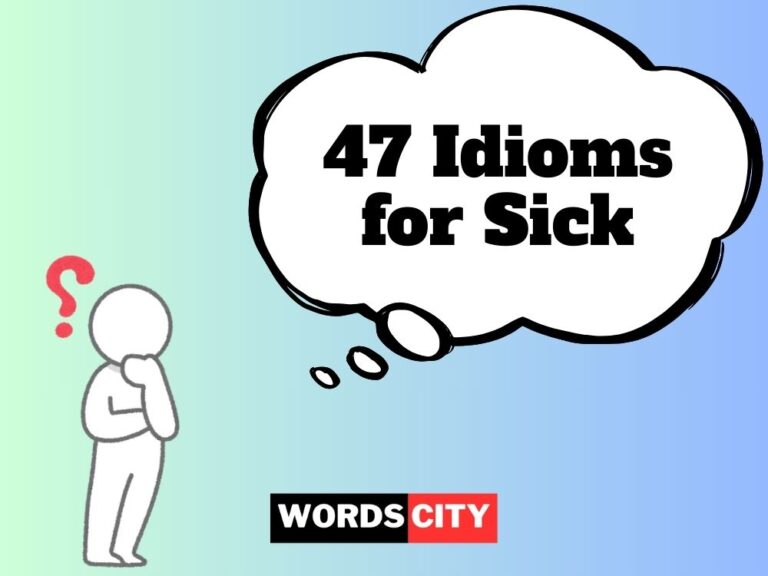Grief is one of the most personal and profound emotions we experience, yet finding the right words to describe it can be incredibly difficult. That’s where idioms come in. Idioms are creative, figurative expressions that help us talk about heavy feelings—like sadness, loss, and mourning—in a way that’s easier to understand and connect with. Whether someone is dealing with heartbreak, the passing of a loved one, or a period of deep sorrow, idioms offer a softer, more human way to express what words often struggle to capture.
These expressions don’t always mean exactly what the words suggest, but they carry emotional weight and cultural meaning that make them relatable. Learning idioms related to grief can help people better support others, write more empathetic messages, or simply understand that their feelings are valid and shared. In this post, we’ll explore 47 powerful idioms that relate to grief, sadness, and the emotional journey that comes with healing. Each idiom comes with its meaning, a sample sentence, and alternative phrases you can use. Let’s walk gently into this emotional territory together and explore the language of sorrow and strength.
Idioms for Grief
1. Cry over spilled milk
Meaning: To be upset about something that has already happened and cannot be changed.
In a Sentence: There’s no use crying over spilled milk—what’s done is done, and we have to move forward somehow.
Other Ways to Say: Dwell on the past, Regret what can’t be undone
2. Broken heart
Meaning: Deep emotional pain due to loss, especially from love or death.
In a Sentence: After losing her grandmother, she felt like she was walking around with a broken heart that wouldn’t mend.
Other Ways to Say: Heartache, Devastated with grief
3. Down in the dumps
Meaning: Feeling sad or depressed.
In a Sentence: Ever since the news of the accident, he’s been really down in the dumps and barely speaks.
Other Ways to Say: Feeling low, Deeply sad
4. A heavy heart
Meaning: A strong feeling of sorrow or sadness.
In a Sentence: With a heavy heart, we said our final goodbyes at the funeral.
Other Ways to Say: Filled with sorrow, Burdened with emotion
5. Fall to pieces
Meaning: To become overwhelmed with grief or emotional distress.
In a Sentence: She fell to pieces when she heard about her best friend’s sudden passing.
Other Ways to Say: Break down, Collapse emotionally
6. Hit hard
Meaning: To affect someone deeply and painfully, especially emotionally.
In a Sentence: The news of his father’s illness hit her hard and left her numb for days.
Other Ways to Say: Shock deeply, Impact emotionally
7. Cry one’s eyes out
Meaning: To cry a lot, usually from sadness or pain.
In a Sentence: He cried his eyes out after losing his beloved dog of ten years.
Other Ways to Say: Sob uncontrollably, Weep deeply
8. Choke up
Meaning: To become too emotional to speak.
In a Sentence: She choked up while giving her farewell speech at the memorial service.
Other Ways to Say: Become tearful, Struggle to speak
9. A lump in your throat
Meaning: A feeling of emotion that makes it hard to speak.
In a Sentence: As he looked through the old photo album, a lump formed in his throat and he had to stop.
Other Ways to Say: Emotionally overwhelmed, Holding back tears
10. Tears well up
Meaning: To start tearing up or begin to cry.
In a Sentence: Tears welled up in her eyes the moment she heard the song that reminded her of him.
Other Ways to Say: Begin to cry, Tear up
11. Carry a burden
Meaning: To feel emotionally weighed down, often by grief or guilt.
In a Sentence: He’s been carrying the burden of guilt ever since the accident happened.
Other Ways to Say: Bear emotional weight, Struggle with sorrow
12. Heart sinks
Meaning: To feel sudden disappointment or sorrow.
In a Sentence: Her heart sank when the doctor shook his head and said there was nothing more to do.
Other Ways to Say: Feel crushed, Overwhelmed by sadness
13. A shadow of one’s former self
Meaning: Someone who has become very different, usually due to sadness or trauma.
In a Sentence: After losing her child, she became a shadow of her former self, withdrawn and silent.
Other Ways to Say: Emotionally changed, Not the same anymore
14. Pour one’s heart out
Meaning: To express deep feelings of sadness or grief.
In a Sentence: During therapy, he finally poured his heart out about how lonely he’s been.
Other Ways to Say: Open up emotionally, Speak from the heart
15. Bear the weight of the world
Meaning: To feel as if one is carrying all of life’s sorrow and responsibility.
In a Sentence: Ever since her husband died, she’s looked like she’s bearing the weight of the world on her shoulders.
Other Ways to Say: Overwhelmed by pain, Carry deep sorrow
16. In a dark place
Meaning: Being in a state of deep emotional pain or depression.
In a Sentence: He was in a dark place for months after the breakup, barely able to function.
Other Ways to Say: Depressed, Struggling emotionally
17. A sinking feeling
Meaning: A sudden sense of dread, worry, or grief.
In a Sentence: She had a sinking feeling the moment the phone rang late at night.
Other Ways to Say: Gut feeling of sadness, Sudden dread
18. A stab to the heart
Meaning: A sharp emotional pain caused by hurt or loss.
In a Sentence: Seeing her childhood home demolished was like a stab to the heart.
Other Ways to Say: Deep emotional blow, Piercing sadness
19. Cry a river
Meaning: To cry a great deal.
In a Sentence: After reading the letter, she cried a river thinking about everything they lost.
Other Ways to Say: Sob endlessly, Drown in tears
20. Like a ton of bricks
Meaning: A situation or emotion that hits suddenly and powerfully.
In a Sentence: When she realized he wasn’t coming back, the truth hit her like a ton of bricks.
Other Ways to Say: Hit hard emotionally, Sudden emotional blow
21. Cloud of sorrow
Meaning: A lingering feeling of sadness.
In a Sentence: Ever since his mother passed away, he’s been living under a cloud of sorrow.
Other Ways to Say: Deep sadness, Emotional gloom
22. Swallowed by grief
Meaning: To be overwhelmed or consumed by sadness.
In a Sentence: She felt completely swallowed by grief after the funeral and didn’t know how to go on.
Other Ways to Say: Consumed with sorrow, Lost in sadness
23. Carry a torch
Meaning: To continue loving or missing someone after they’re gone.
In a Sentence: Even after all these years, he still carries a torch for the one who left too soon.
Other Ways to Say: Long for someone, Cling to memory
24. In mourning
Meaning: Going through the period of grief after losing someone.
In a Sentence: The whole family was in mourning, wearing black and sharing memories of their grandmother.
Other Ways to Say: Grieving, In sorrow
25. Drown in sorrow
Meaning: To feel consumed by sadness.
In a Sentence: After the divorce, he drowned in sorrow and avoided everyone for weeks.
Other Ways to Say: Lost in grief, Consumed by sadness
26. Grin and bear it
Meaning: To endure a painful situation without complaining.
In a Sentence: She had to grin and bear it when she returned to work just days after her loss.
Other Ways to Say: Suffer silently, Push through pain
27. Close to tears
Meaning: About to start crying.
In a Sentence: He was close to tears while packing away his son’s belongings.
Other Ways to Say: Nearly crying, Holding back emotions
28. Bottle up emotions
Meaning: To keep one’s feelings hidden instead of expressing them.
In a Sentence: She bottled up her emotions for years, never talking about the accident that changed her life.
Other Ways to Say: Keep emotions inside, Suppress feelings
29. Hard pill to swallow
Meaning: Something difficult to accept or cope with.
In a Sentence: Losing her job right after her husband’s death was a hard pill to swallow.
Other Ways to Say: Difficult truth, Painful reality
30. Hit rock bottom
Meaning: To reach the lowest emotional point.
In a Sentence: He hit rock bottom after the funeral, barely getting out of bed for days.
Other Ways to Say: Lowest point, Deepest despair
31. Not a dry eye in the house
Meaning: Everyone present was crying.
In a Sentence: When she shared her tribute, there wasn’t a dry eye in the house.
Other Ways to Say: Everyone was crying, Deeply moving moment
32. Rain on someone’s parade
Meaning: To bring sadness during a happy moment.
In a Sentence: He didn’t want to rain on her parade, so he kept the bad news to himself until after the celebration.
Other Ways to Say: Ruin the moment, Bring sadness
33. Feel blue
Meaning: To feel sad or melancholic.
In a Sentence: I’ve been feeling blue ever since my sister moved away.
Other Ways to Say: Sad, Downhearted
34. Drag one’s feet
Meaning: To delay or be slow because of sadness or reluctance.
In a Sentence: He dragged his feet while packing up the room—they were filled with too many memories.
Other Ways to Say: Be reluctant, Move slowly with sorrow
35. Tearjerker
Meaning: Something that makes you cry, usually a story or moment.
In a Sentence: The movie was a tearjerker, especially the scene where the mother says goodbye.
Other Ways to Say: Sad story, Emotional moment
36. Feel hollow inside
Meaning: To feel emotionally empty.
In a Sentence: After the funeral, she felt hollow inside like something vital had been taken from her.
Other Ways to Say: Emotionally numb, Empty-hearted
37. Waves of grief
Meaning: Sudden surges of sadness that come and go.
In a Sentence: Grief doesn’t stay steady—it comes in waves, often when you least expect it.
Other Ways to Say: Surges of sadness, Rolling emotions
38. Eyes full of sorrow
Meaning: A look of deep emotional pain.
In a Sentence: His eyes were full of sorrow when he saw her picture on the wall.
Other Ways to Say: Tearful gaze, Painful expression
39. Sink into despair
Meaning: To fall into a state of deep sadness or hopelessness.
In a Sentence: Without any support system, he slowly sank into despair and isolated himself.
Other Ways to Say: Lose hope, Be overcome by sorrow
40. Lost in thought
Meaning: Deeply distracted or reflecting, often due to sadness.
In a Sentence: She sat by the window, lost in thought about what could have been.
Other Ways to Say: Deep in sorrowful reflection, Mentally distant
41. At a loss for words
Meaning: Unable to speak due to overwhelming emotion.
In a Sentence: When he saw the destruction, he was at a loss for words.
Other Ways to Say: Speechless, Too emotional to respond
42. A silent goodbye
Meaning: Leaving or losing someone without being able to say farewell.
In a Sentence: She never got to say anything before he passed—it was a silent goodbye.
Other Ways to Say: Unspoken farewell, Goodbye without closure
43. Cry yourself to sleep
Meaning: To fall asleep after crying due to sadness.
In a Sentence: She cried herself to sleep every night for weeks after her brother died.
Other Ways to Say: Weep to sleep, Fall asleep in tears
44. Torn apart
Meaning: Emotionally destroyed by grief or loss.
In a Sentence: He was torn apart by the news that he’d never see her again.
Other Ways to Say: Devastated, Emotionally shattered
45. Left in the lurch
Meaning: To be abandoned or left to deal with something painful alone.
In a Sentence: After the tragedy, she felt left in the lurch with no support from her friends.
Other Ways to Say: Left behind, Abandoned in pain
46. Not the same anymore
Meaning: Changed by emotional trauma or grief.
In a Sentence: After everything he’s been through, he’s just not the same anymore.
Other Ways to Say: Emotionally altered, Changed by sorrow
47. Walk through fire
Meaning: To go through extreme emotional hardship.
In a Sentence: She’s walked through fire these past months, dealing with loss after loss.
Other Ways to Say: Endure extreme pain, Survive deep grief
Exercise to Practice
Fill in the blanks with the correct idiom from the list above:
- When she heard the heartbreaking news, she felt a _________ form in her throat.
- He didn’t complain about the pain—he just had to _________ and return to work.
- Ever since her best friend moved away, she’s been feeling really _________.
- After the funeral, it felt like she was _________ and couldn’t find peace.
- When his dog passed, he _________ every night for a week.
- The sudden news of the accident hit him like a _________.
- Even though she smiled at the party, her _________ gave away how much she was hurting inside.
- After the separation, he was emotionally destroyed—completely _________.
- At the memorial, there wasn’t a _________ in the house.
- Looking at the old photographs gave her a _________ and she couldn’t stop crying.
- He kept _________ instead of talking to anyone about his loss.
- After the tragedy, she felt completely _________, like no one understood.
Answers:
- lump in her throat
- grin and bear it
- down in the dumps
- swallowed by grief
- cried himself to sleep
- ton of bricks
- eyes full of sorrow
- torn apart
- dry eye
- sinking feeling
- bottling up his emotions
- left in the lurch
Conclusion
Grief is something we all experience, yet it often feels deeply personal and isolating. Idioms offer us a way to connect and share our pain through language that resonates emotionally. These expressions allow us to describe sadness, heartbreak, and emotional endurance in ways that go beyond just saying “I’m sad.” Whether you’re trying to comfort someone, write about loss, or simply find words for what you’re feeling, these idioms can offer comfort, meaning, and a way to heal.
Use these phrases in writing, speech, or quiet reflection. Over time, understanding these idioms will not only expand your vocabulary but also deepen your emotional awareness and compassion for others. Remember, grief may feel like a storm, but language can be a lifeboat—and idioms can help carry us through the roughest waves.



